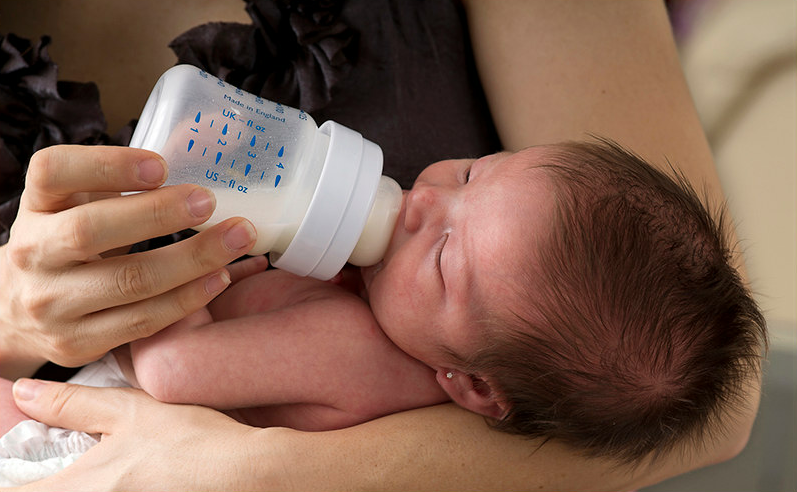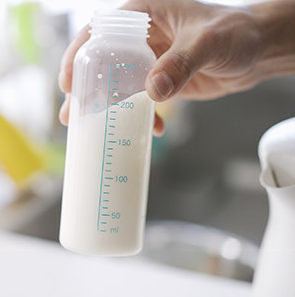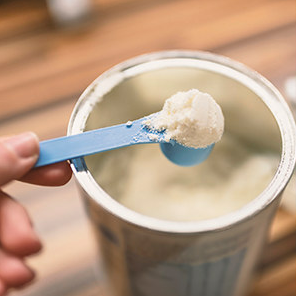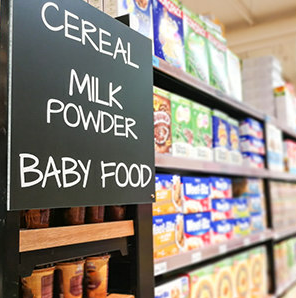Help finding baby formula and other tips for feeding your baby during the shortage

If you’re a parent of an infant or baby, you may be affected by the recent baby formula shortage, due to the recall of several baby formula products as well as general supply chain challenges.
The shortage has led many parents and caretakers to seek alternative types of formulas, including so-called alternative sources like store-bought milks or homemade recipes that may be dangerous to a growing baby.
Please follow the tips below for locating baby formula and finding safe, nourishing alternatives in the meantime.
Where to find baby formula
-
Smaller stores such as locally-owned or convenience stores.
- Online stores (but avoid purchasing from individuals, auction sites, or stores you’re unfamiliar with).
- A local milk bank that’s accredited through the Human Milk Banking Association of North America.
- The Special Supplemental Nutrition Program for Women, Infants, and Children (WIC). Click here to learn more and apply.
- Contact your pediatrician or family medicine provider if you are unable to find formula.
What to avoid
1. Watering down your formula to “stretch” your supply
“Diluting baby formula with extra water reduces the levels of protein and critical minerals. This malnourishment can lead to risk of seizures and hospitalization,” explains Munson Medical Center’s Pediatric Medical Director and pediatrician Jacques Burgess, MD, MPH, SFHM. “Remember to ALWAYS follow the proper mixing instructions – and if you’re in a pinch and need further guidance, call your pediatrician/family medicine provider right away.”
2. Homemade baby formula
“While the idea is well-intended, using homemade baby formula can harm your infant,” says Dr. Burgess. “Baby hospitalizations have increased due to reported use of these homemade formulas, which often don’t include the right amount of nutrients – or the ingredients themselves may be contaminated.”
3. Buying more than a 2-week supply of formula.

Buying up extra formula will only worsen the formula shortage. The more parents avoid this temptation, the sooner the shortage will ease.
4. Feeding your baby solid food without approval from your pediatrician/family medicine provider.
As a general rule of thumb, babies under the age of 6 months are not ready for solid foods. Even at age 6 months, it depends on their stage of development. Talk to your pediatrician/family medicine provider about your baby’s readiness for solid food.
5. Following advice from well-meaning loved ones or social media groups without talking it over with your provider.
“Following recipes or alternative formula tips is never a good idea for your baby. Instead, talk to your pediatrician, who knows exactly what your baby needs to thrive and can help you navigate this shortage,” shares Joan Rikli, Executive Director of Munson Healthcare’s Women’s and Children’s service line.
If you have concerns that your child could be having a medical emergency, call 9-1-1 right away.
Safe vs harmful formulas and milk sources
| Type of Formula or Milk | Appropriate or No? | Length of time |
| Mixing different types or brands of formula. | You can use different brands of formula (as recommended by your pediatrician/provider), but you should not mix different types of formula in the same bottle. If you’re able, try introducing small amounts of the new formula mixed with your baby’s usual formula. Slowly increase the amount of the new formula. | Indefinite if you mix brands. |
| Cow’s Milk | If you cannot locate any formula and you’re in a pinch, cow’s milk can be used for babies six months and older who are on regular (not specialty) formula. Feed whole cow’s milk only. | No more than one week. Talk with your pediatrician/family medicine provider first and ask about supplemental foods with iron. |
| Goat’s milk | Goats milk is not approved for babies in the US. Formula the US imports from other countries in the future may contain goats milk but must first be approved by the FDA. | N/A |
| Toddler formula | Not recommended for infants. You may be able to use this formula for babies age one or older. | A few days only (for babies close to a year or older). Talk to your pediatrician/family medicine provider. |
| Soy Milk | Not recommended for babies under the age of one. Look for brands that say calcium and Vitamin D fortified. | A few days only (for babies close to a year or older). Talk to your pediatrician/family medicine provider. |
| Other plant-based milks | Avoid. Milks like almond or coconut don’t contain enough protein or minerals. | N/A |
| Formula for premature babies | You can substitute with this type of formula for a few days. | A few days only. Talk to your pediatrician/family medicine provider. |
| Expired formula | Avoid. Formula that is used beyond the "best by" date may no longer be safe or have the required levels of nutrients. | N/A |
Other frequently asked formula questions
Where can I find specialty metabolic baby formula for my infant?
Abbott is releasing limited quantities of Similac PM 60/40 and other metabolic formulas. Call your pediatrician's office so they can fill out a request. If approved, the formula can be shipped to your home. Ask your pediatrician or family medicine provider about safe, alternative formulas you can use while you wait for your shipment.
I can’t find the brand of baby formula covered under the WIC program. What should I do?

The state of Michigan is allowing parents who use WIC benefits to purchase alternative brands of formula without a doctor’s note, as well as different sizes and forms (like ready-to-feed formula). You can also exchange any recalled formula purchased with your WIC benefits.
I have an infant or baby with allergies and/or special health needs. What should I do?
Use this list of comparable formulas, provided by The North American Society For Pediatric Gastroenterology, Hepatology & Nutrition.
I’m concerned that baby formula imported from other countries won’t be safe.
The Food & Drug Administration (FDA) is working diligently to ensure the proper procedures are in place, including verification of production standards, labeling, and shipping of brands that haven’t been previously sold in the United States. European formulas are regulated by the European Food Safety Agency much like how the FDA regulates U.S. formula and are very reliable.
Helpful Resources
Healthy Futures
Healthy Futures is a local program (serving 31 counties in our northern Michigan region) created with the help of Munson Healthcare to connect you to relevant local sources that will help you make the best decisions for you and your baby, including:
- Proper nourishment
- Tips and personalized coaching to begin or make the switch to breastfeeding
- And more
Call 231-935-5640, email info@healthyfuturesonline.org, or visit https://healthyfuturesonline.org/ to learn more about Healthy Futures, including free enrollment, classes, and their monthly newsletter.
Find-a-Doc for your baby
Need a pediatrician or family medicine provider who can help guide you as your child grows? Click here to get started and find a provider near you.
